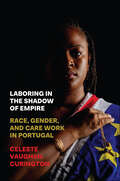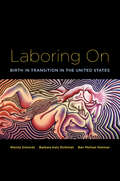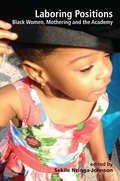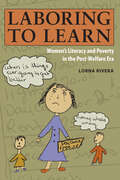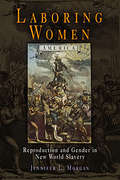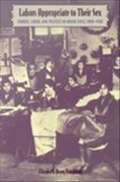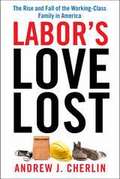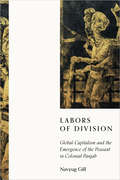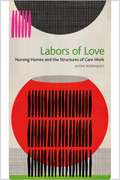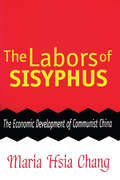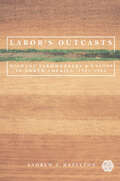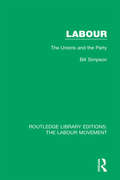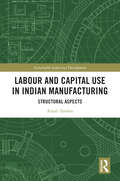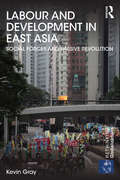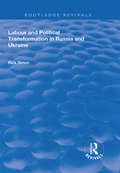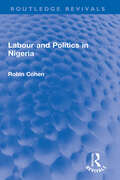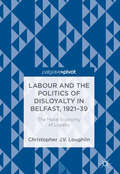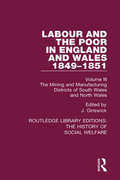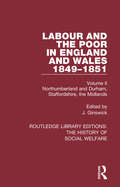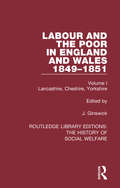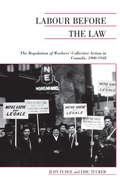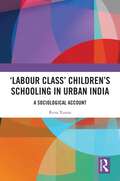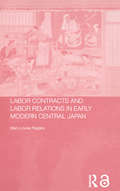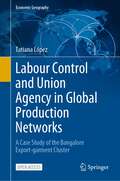- Table View
- List View
Laboring in the Shadow of Empire: Race, Gender, and Care Work in Portugal (Inequality at Work: Perspectives on Race, Gender, Class, and Labor)
by Celeste Vaughan CuringtonLaboring in the Shadow of Empire: Race, Gender, and Care Work in Portugal examines the everyday lives of an African-descendant care service workforce that labors in an ostensibly “anti-racial” Europe and against the backdrop of the Portuguese colonial empire. While much of the literature on global care work has focused on Asian and Latine migrant care workers, there is comparatively less research that explicitly examines African care workers and their migration histories to Europe. Sociologist Celeste Vaughan Curington focuses on Portugal—a European setting with comparatively liberal policies around family settlement and naturalization for migrants. In this setting, rapid urbanization in the late twentieth century, along with a national push to reconcile work and family, has shaped the growth of paid home care and cleaning service industries. Many researchers focus on informal work settings, where immigrant rights are restricted and many workers are undocumented or without permanent residence status. Curington instead examines workers who have accessed citizenship or permanent residence status and also explores African women’s experiences laboring in care and service industries in the formal market, revealing how deeply colonial and intersectional logics of a racialized and international division of reproductive labor in Portugal render these women “hyper-invisible” and “hyper-visible” as “appropriate” workers in Lisbon.
Laboring On: Birth in Transition in the United States (Perspectives on Gender)
by Barbara Katz Rothman Wendy Simonds Bari Meltzer NormanFacing the polar forces of an epidemic of Cesarean sections and epidurals and home-like labor rooms, American birth is in transition. Caught between the most extreme medicalization — best seen in a Cesarean section rate of nearly 30 percent — and a rhetoric of women’s "choices" and "the natural," women and their midwives, doulas, obstetricians, and nurses labor on. Laboring On offers the voices of all of these practitioners, all women trying to help women, as they struggle with this increasingly split vision of birth. Updating Barbara Katz Rothman's now-classic In Labor, the first feminist sociological analysis of birth in the United States, Laboring On gives a comprehensive picture of the ever-changing American birth practices and often conflicting visions of birth practitioners. The authors deftly weave compelling accounts of birth work, by midwives, doulas, obstetricians, and nurses, into the larger sociohistorical context of health care practices and activism and offer provocative arguments about the current state of affairs and the future of birth in America.
Laboring Positions: Black Women, Mothering And The Academy
by Sekile Nzinga-JohnsonLaboring Positions aims to disrupt the dominant discourse on academic women’s mothering experiences. Black women’s maternity is assumed, and yet is also silenced within the disembodied, patriarchal, racist, antifamily, and increasingly neoliberal work environment of academia. This volume acknowledges the salience of the institutional challenges facing contemporary caregiving academics; yet it is centrally concerned with expanding the academic mothering conversation by speaking against the private/public spheres approach. Laboring Positions does so by privileging the hybridity between Black women’s mothering experiences and their working lives within and beyond the academy. The collection also intentionally blurs essentialist boundaries of mother and “other”, which dictates and generates alternate border zones of knowledge production concerning Black academic women’s working lives. In doing so, the diverse perspectives captured herein offer us cogent starting points from which to interrogate the interlocking cultural, political, and economic hierarchies of the academy. The editorial goal of Laboring Positions is to offer a polyvocal collection embodying themes that privilege and arouse Black mothering as central in the narratives, research, and models of existence and resistance for Black women’s survival within the academy. The contributors utilize a wide variety of methods and perspectives including Black feminist theory, intersectional feminism, Womanist research ethics, hip-hop feminism, African-centered epistemologies, literary analysis, autoethnography, policy analysis, memoir, qualitative research, survival strategies and frameworks, and situated testimony that are all collectively bound by Black women’s intellectual lives, activist impulses, and experiences of mothering or being mothered. The critical embodied perspectives herein serve as evidence that Black women exist beyond the institutional and ideological boundaries that have attempted to define their journeys. Laboring Positions’ chapters speak to each other and some conversations are louder than others; yet together they offer us a complexly nuanced portrait of the emergent literature on race, gender, mothering, and work.
Laboring to Learn: Women's Literacy and Poverty in the Post-Welfare Era
by Lorna RiveraThe American adult education system has become an alternative for school dropouts, with some state welfare policies requiring teen mothers and women without high school diplomas to participate in adult education programs to receive aid. Currently, low-income women of color are more likely to be enrolled in the lowest levels of adult basic education. Very little has been published about women's experiences in these mandatory programs and whether the programs reproduce the conditions that forced women to drop out in the first place. Lorna Rivera bridges the gap with this important study, the product of ten years' active ethnographic research with formerly homeless women who participated in adult literacy education classes before and after welfare reform. She draws on rich interviews with organizers and participants in the Adult Learners Program at Project Hope, a women's shelter and community development organization in Boston's Dudley neighborhood, one of the poorest in the city. Analyzing the web of ideological contradictions regarding "work first" welfare reform policies, Rivera argues that poverty is produced and reproduced when women with low literacy skills are pushed into welfare-to-work programs and denied education. She examines how various discourses about individual choice and self-sufficiency shape the purposes of literacy, how low-income women express a sense of personal responsibility for being poor, and how neoliberal ideologies and practices compromise the goals of critical literacy programs. Throughout this study, the voices and experiences of formerly homeless women challenge cultural stereotypes about poor women, showing in personal and structural terms how social and economic forces shape and restrict opportunities for low-income women of color.
Laboring Women: Reproduction and Gender in New World Slavery
by Jennifer L. MorganWhen black women were brought from Africa to the New World as slave laborers, their value was determined by their ability to work as well as their potential to bear children, who by law would become the enslaved property of the mother's master. In Laboring Women: Reproduction and Gender in New World Slavery, Jennifer L. Morgan examines for the first time how African women's labor in both senses became intertwined in the English colonies. Beginning with the ideological foundations of racial slavery in early modern Europe, Laboring Women traverses the Atlantic, exploring the social and cultural lives of women in West Africa, slaveowners' expectations for reproductive labor, and women's lives as workers and mothers under colonial slavery.Challenging conventional wisdom, Morgan reveals how expectations regarding gender and reproduction were central to racial ideologies, the organization of slave labor, and the nature of slave community and resistance. Taking into consideration the heritage of Africans prior to enslavement and the cultural logic of values and practices recreated under the duress of slavery, she examines how women's gender identity was defined by their shared experiences as agricultural laborers and mothers, and shows how, given these distinctions, their situation differed considerably from that of enslaved men. Telling her story through the arc of African women's actual lives—from West Africa, to the experience of the Middle Passage, to life on the plantations—she offers a thoughtful look at the ways women's reproductive experience shaped their roles in communities and helped them resist some of the more egregious effects of slave life.Presenting a highly original, theoretically grounded view of reproduction and labor as the twin pillars of female exploitation in slavery, Laboring Women is a distinctive contribution to the literature of slavery and the history of women.
Labors Appropriate to Their Sex: Gender, Labor, and Politics in Urban Chile, 1900-1930
by Elizabeth Quay HutchisonIn Labors Appropriate to Their Sex Elizabeth Quay Hutchison addresses the plight of working women in early twentieth-century Chile, when the growth of urban manufacturing was transforming the contours of women's wage work and stimulating significant public debate, new legislation, educational reform, and social movements directed at women workers. Challenging earlier interpretations of women's economic role in Chile's industrial growth, which took at face value census figures showing a dramatic decline in women's industrial work after 1907, Hutchison shows how the spread of industrial sweatshops and changing definitions of employment in the census combined to make female labor disappear from census records at the same time that it was in fact burgeoning in urban areas. In addition to population and industrial censuses, Hutchison culls published and archival sources to illuminate such misconceptions and to reveal how women's paid labor became a locus of anxiety for a society confronting social problems--both real and imagined--that were linked to industrialization and modernization. The limited options of working women were viewed by politicians, elite women, industrialists, and labor organizers as indicative of a society in crisis, she claims, yet their struggles were also viewed as the potential springboard for reform. Labors Appropriate to Their Sex thus demonstrates how changing norms concerning gender and work were central factors in conditioning the behavior of both male and female workers, relations between capital and labor, and political change and reform in Chile. This study will be rewarding for those whose interests lie in labor, gender, or Latin American studies; as well as for those concerned with the histories of early feminism, working-class women, and sexual discrimination in Latin America.
Labor's Love Lost: The Rise and Fall of the Working-Class Family In America
by Andrew J. CherlinTwo generations ago, young men and women with only a high-school degree would have entered the plentiful industrial occupations which then sustained the middle-class ideal of a male-breadwinner family. Such jobs have all but vanished over the past forty years, and in their absence ever-growing numbers of young adults now hold precarious, low-paid jobs with few fringe benefits. Facing such insecure economic prospects, less-educated young adults are increasingly forgoing marriage and are having children within unstable cohabiting relationships. This has created a large marriage gap between them and their more affluent, college-educated peers. In Labor's Love Lost, noted sociologist Andrew Cherlin offers a new historical assessment of the rise and fall of working-class families in America, demonstrating how momentous social and economic transformations have contributed to the collapse of this once-stable social class and what this seismic cultural shift means for the nation's future. Drawing from more than a hundred years of census data, Cherlin documents how today's marriage gap mirrors that of the Gilded Age of the late-nineteenth century, a time of high inequality much like our own. Cherlin demonstrates that the widespread prosperity of working-class families in the mid-twentieth century, when both income inequality and the marriage gap were low, is the true outlier in the history of the American family. In fact, changes in the economy, culture, and family formation in recent decades have been so great that Cherlin suggests that the working-class family pattern has largely disappeared. Labor's Love Lost shows that the primary problem of the fall of the working-class family from its mid-twentieth century peak is not that the male-breadwinner family has declined, but that nothing stable has replaced it. The breakdown of a stable family structure has serious consequences for low-income families, particularly for children, many of whom underperform in school, thereby reducing their future employment prospects and perpetuating an intergenerational cycle of economic disadvantage. To address this disparity, Cherlin recommends policies to foster educational opportunities for children and adolescents from disadvantaged families. He also stresses the need for labor market interventions, such as subsidizing low wages through tax credits and raising the minimum wage. Labor's Love Lost provides a compelling analysis of the historical dynamics and ramifications of the growing number of young adults disconnected from steady, decent-paying jobs and from marriage. Cherlin's investigation of today's "would-be working class" shines a much-needed spotlight on the struggling middle of our society in today's new Gilded Age.
Labors of Division: Global Capitalism and the Emergence of the Peasant in Colonial Panjab (South Asia in Motion)
by Navyug GillOne of the most durable figures in modern history, the peasant has long been a site of intense intellectual and political debate. Yet underlying much of this literature is the assumption that peasants simply existed everywhere, a general if not generic group, traced backward from modernity to antiquity. Focused on the transformation of Panjab during the nineteenth and early twentieth centuries, this book accounts for the colonial origins of global capitalism through a radical history of the concept of "the peasant," demonstrating how seemingly fixed hierarchies were in fact produced, legitimized, and challenged within the preeminent agricultural region of South Asia. Navyug Gill uncovers how and why British officials and ascendant Panjabis disrupted existing forms of identity and occupation to generate a new agrarian order in the countryside. The notion of the hereditary caste peasant engaged in timeless cultivation thus emerged, paradoxically, as a result of a dramatic series of conceptual, juridical, and monetary divisions. Far from archaic relics, this book ultimately reveals both the landowning peasant and landless laborer to be novel political subjects forged through the encounter between colonialism and struggles over culture and capital within Panjabi society. Questions of progress, exploitation and knowledge come to animate the vernacular operations of power. With this history, Gill brings difference and contingency to understandings of the global past in order to re-think the itinerary of comparative political economy as well as alternative possibilities for emancipatory futures.
Labors of Love: Gender, Capitalism, and Democracy in Modern Arab Thought
by Susanna FergusonHow to raise a child became a central concern of intellectual debate from Cairo to Beirut over the course of the late nineteenth and early twentieth centuries. Intimately linked with discussions around capitalism and democracy, considerations about women, gender, and childrearing emerged as essential to modern social theory. Arab writers, particularly women, made sex, the body, and women's ethical labor central to fending off European imperial advances, instituting representative politics, and managing social order. Labors of Love traces the political power of motherhood and childrearing in Arabic thought. Susanna Ferguson reveals how debates around raising children became foundational to feminist, Islamist, and nationalist politics alike—opening up conversations about civilization, society, freedom, temporality, labor, and democracy. While these debates led to expansions in girls' education and women writers' authority, they also attached the fate of nations to women's unwaged labor in the home. Ferguson thus reveals why women and the family have been stumbling blocks for representative regimes around the world. She shows how Arab women's writing speaks to global questions—the devaluation of social reproduction under capitalism, the stubborn maleness of the liberal subject, and why the naturalization of embodied, binary gender difference has proven so difficult to overcome.
Labors of Love: Nursing Homes and the Structures of Care Work
by Jason RodriquezEvery day for the next twenty years, more than 10,000 people in the United States will turn 65. With life expectancies increasing as well, many of these Americans will eventually require round-the-clock attention—and we have only begun to prepare for the challenge of caring for them. In Labors of Love, Jason Rodriquez examines the world of the fast-growing elder care industry, providing a nuanced and balanced portrait of the day-to-day lives of the people and organizations that devote their time to supporting America’s aging population. Through extensive ethnographic research, interviews with staff and management, and analysis of internal documents, Rodriquez explores the inner workings of two different nursing homes—one for-profit and one non-profit—to understand the connections among the administrative regulations, the professional requirements, and the type of care provided in both types of facilities. He reveals a variety of challenges that nursing home care workers face day to day: battles over the budget; the administrative hurdles of Medicaid and Medicare; the employees’ struggle to balance financial stability and compassionate care for residents. Yet, Rodriquez argues, nursing home workers give meaning and dignity to their work by building emotional attachments to residents and their care. An unprecedented study, Labors of Love brings new insight into the underlying structures of a crucial and expanding sector of the American health care system.
The Labors of Sisyphus: Economic Development of Communist China
by Joan RolandAlmost a half century has passed since the inception of the People's Republic cf China. In that time a charismatic leader has ruled and died, leaving a wake of .Destruction in his quest to transform China. In that time, too, the PRC's most powerful ally and mentor, the Soviet Union, has dismantled and announced that jcmmunism had failed. Today, China fluctuates between tradition and modernity, ideology and pragmatism, between an antiquated collectivist ethic and a new spirit rf individualism. It is a country precariously suspended between past and future. Maria Hsia Chang's The Labors of Sisyphus is a long overdue reassessment of rie meaning and purpose of the Chinese communist revolution. In it, she discusses ihe thought of Mao Zedong and Deng Xiaoping, reform and its dilemmas, regionalism in greater China and autonomous areas, and nationalism. She also eyjnines China's immediate present and uncertain future. If it manages to transform economic growth into development, China--filled with natural resources and a large, capable labor force--has the potential to become a world superpower. It could also collapse under the weight of its own problems: regionalism, a flawed state sector, corruption, and a pronounced decline in state capacity. If China succeeds, an imposing new economic power will enter the global stage, one that is often arbitrary and prone to despotism and xenophobia, unless it is tempered by political reform. Prior accounts of communist China have failed to capture China's evolving present In all its complexity and variety, misrepresenting Maoist China In the process. Information shortfall was partly to blame: as recently as August 1994, the Chinese government itself decried falsification of statistics by government officials and cadres. Sinologists in the 1960s and 1970s had to approach analysis of contemporary China with clear recognition of the limitations involved and the questionable validity of the factual sources available. Maria Hsia Chang lends structure, meaning, and purpose to the very complex recent political and historical past of communist China. With greater access to more accurate information, Chang is able to analyze objectively, without political motive or intention, providing readers with a fresh look at the People's Republic. Her pathbreaking work will be of interest to scholars of international economics and politics, sinologists, and historians.
Labor's Outcasts: Migrant Farmworkers and Unions in North America, 1934-1966 (Working Class in American History)
by Andrew J. HazeltonIn the mid-twentieth century, corporations consolidated control over agriculture on the backs of Mexican migrant laborers through a guestworker system called the Bracero Program. The National Agricultural Workers Union (NAWU) attempted to organize these workers but met with utter indifference from the AFL-CIO. Andrew J. Hazelton examines the NAWU's opposition to the Bracero Program against the backdrop of Mexican migration and the transformation of North American agriculture. His analysis details growers’ abuse of the program to undercut organizing efforts, the NAWU's subsequent mobilization of reformers concerned by those abuses, and grower opposition to any restrictions on worker control. Though the union's organizing efforts failed, it nonetheless created effective strategies for pressuring growers and defending workers’ rights. These strategies contributed to the abandonment of the Bracero Program in 1964 and set the stage for victories by the United Farm Workers and other movements in the years to come.
Labour: The Unions and the Party (Routledge Library Editions: The Labour Movement #31)
by Bill SimpsonFirst published in 1973. In this study, the author adopts a historical approach, tracing the evolution of socialist thinking during the past century and relating this to the growth of the union movement. The Taff Vale judgement, the Osborne judgement, the roles of the SDF, the Fabians, and the ILP - these episodes are re-examined from a novel perspective, and the historical material is frequently illuminated by the use of contemporary analogies. The second half of the book presents an analytical study of differing union political theories and attitudes against the modern industrial background. Here the Marxist case is studied in depth and contrasted with the views of the Social Democrats. The author then considers the ownership and control of the economy, industrial relations, prices and incomes and inflation, making it clear where he feels the movement should stand on the key political issues of today. Finally, the book suggests the way in which the Labour Party and the trade unions should organise for power in the country.
Labour and Capital Use in Indian Manufacturing: Structural Aspects (Sustainable Industrial Development)
by Anjali TandonThis book strengthens our understanding of Indian manufacturing. It argues that structural transformation should be guided by the given factor endowments. The book undertakes detailed empirical scrutiny to provide inputs for guiding the future industrial policy in India. The book recognises the differential structure of organised and unorganised manufacturing with their distinguished response to the use of labour and capital. The analytical framework consists of an economy-wide approach and structural relationships at the industry level. The underlying sectoral interdependence highlights the job creation potential of domestic manufacturing, which spreads into the non-manufacturing sectors through the essential accounting of the embodied effects. The impact of import utilisations underscores the leakages in the domestic economy in terms of the employment forgone and capital use, thereby highlighting the need to strengthen domestic production. The book clearly identifies the labour- and capital-intensive categories of manufacturing for empirical investigations. A comprehensive read on labour and capital use in Indian manufacturing, this book in the series Sustainable Industrial Development will appeal to scholars and researchers of economics, applied industrial economics, Indian economy, and business studies. It will also be of interest to professionals and practitioners in policy circles and research think tanks.
Labour and Development in East Asia: Social Forces and Passive Revolution (Rethinking Globalizations)
by Kevin GrayThe Chinese Communist Party’s response to the wave of factory strikes in the early summer of 2010 has raised important questions about the role that labour plays in the transformation of world orders. In contrast to previous policies of repression towards labour unrest, these recent disputes centring round wages and working conditions have been met with a more permissive response on the part of the state, as the CCP ostensibly seeks to facilitate a transition away from a model of political economy based on ‘low-road’ labour relations and export dependence. Labour and Development in East Asia shows that such inter-linkages between labour, geopolitical transformations, and states’ developmental strategies have been much more central to East Asia’s development than has commonly been recognised. By adopting an explanatory framework of the labour-geopolitics-development nexus, the book theorises and provides an historical analysis of the formation and transformation of the East Asian regional political economy from the end of the Second World War to the present, with particular reference to Japan, South Korea, Taiwan and China. This book will be required reading for students and scholars of international relations, development studies and comparative politics.
Labour and Political Transformation in Russia and Ukraine (Routledge Revivals)
by Rick SimonThis title was first published in 2000. The years 1975 to 2000 are characterized by fundamental changes in the global political landscape. Perhaps the biggest change was the collapse of certain communist regimes. This text analyzes what that meant for the USSR and Europe. It looks at the cause of change, the social forces behind them and future prospects.
Labour and Politics in Nigeria (Routledge Revivals)
by Robin CohenOriginally published in 1974 and with a new introduction for the 1981 edition, this book is a clear and vivid history of the role of organized labour in the politics of Nigeria. It covers the period from the first General Strike of 1945 to the civil war and reintegration of the country. As well as providing an analysis of the characteristics and attitudes of Nigeria’s wage earners, this study is concerned with their place in the wider political and social life of the country. The attempts of the trade unions to create a representative central labour organisation are considered, as is the internal structure of the unions themselves. The book also examines the relationship of the Unions with the political parties of the first Republic and later with the Military Government. The influence of the trade unions in the determination of wage rates is analysed. The book concludes with an overview of trade unions in other parts of Africa with which the performance and characteristics of organized labour in Nigeria are compared
Labour and the Politics of Disloyalty in Belfast, 1921-39: The Moral Economy of Loyalty
by Christopher J. V. LoughlinThis book provides the first ‘history from below’ of the inter-war Belfast labour movement. It is a social history of the politics of Belfast labour and applies methodology from history, sociology and political science. Christopher J. V. Loughlin questions previous narratives that asserted the centrality of religion and sectarian conflict in the establishment of Northern Ireland. Labour and the Politics of Disloyalty in Belfast, 1921-39 suggests that political division and violence were key to the foundation and maintenance of the democratic ancien régime in Northern Ireland. It examines the relationship between Belfast Labour, sectarianism, electoral politics, security and industrial relations policy, and women’s politics in the city.
Labour and the Poor in England and Wales - The letters to The Morning Chronicle from the Correspondants in the Manufacturing and Mining Districts, the Towns of Liverpool and Birmingham, and the Rural Districts: Volume III: The Mining and Manufacturing Districts of South Wales, North Wales (Routledge Library Editions: The History of Social Welfare)
by J GinswickThe Morning Chronicle presented the state of the working classes of Britain before the public with clarity, insight and honesty. Consisting mainly of verbatim statements from the people themselves, it was a medium through which the previously inarticulate masses were able to speak with one firm voice. First published in 1983, this book collates the letters from correspondents based in Wales. The letters improve our knowledge of working-class life in nineteenth century England and Wales and provide a unique insight into the impact of industrialization. This book will be of interest to those studying the history of the working class, labour and poverty.
Labour and the Poor in England and Wales - The letters to The Morning Chronicle from the Correspondants in the Manufacturing and Mining Districts, the Towns of Liverpool and Birmingham, and the Rural Districts: Volume II: Northumberland and Durham, Staffordshire, The Midlands (Routledge Library Editions: The History of Social Welfare)
by J. GinswickThe Morning Chronicle presented the state of the working classes of Britain before the public with clarity, insight and honesty. Consisting mainly of verbatim statements from the people themselves, it was a medium through which the previously inarticulate masses were able to speak with one firm voice. First published in 1983, this book collates the letters from correspondents based in Northumberland and Durham, Staffordshire and the Midlands. The letters improve our knowledge of working-class life in nineteenth century England and Wales and provide a unique insight into the impact of industrialization. This book will be of interest to those studying the history of the working class, labour and poverty.
Labour and the Poor in England and Wales - The letters to The Morning Chronicle from the Correspondants in the Manufacturing and Mining Districts, the Towns of Liverpool and Birmingham, and the Rural Districts: Volume I: Lancashire, Cheshire, Yorkshire (Routledge Library Editions: The History of Social Welfare)
by J. GinswickThe Morning Chronicle presented the state of the working classes of Britain before the public with clarity, insight and honesty. Consisting mainly of verbatim statements from the people themselves, it was a medium through which the previously inarticulate masses were able to speak with one firm voice. First published in 1983, this book collates the letters from correspondents based in Lancashire, Cheshire and Yorkshire. The letters improve our knowledge of working-class life in nineteenth century England and Wales and provide a unique insight into the impact of industrialization. This book will be of interest to those studying the history of the working class, labour and poverty.
Labour Before the Law
by Judy Fudge Eric TuckerIn this groundbreaking study of the relations between workers and the state, Judy Fudge and Eric Tucker examine the legal regulation of workers' collective action from 1900 to 1948. They analyze the strikes, violent confrontations, lockouts, union organizing drives, legislative initiatives, and major judicial decisions that transformed the labour relations regime of liberal voluntarism, which prevailed in the later part of the nineteenth century, into industrial voluntarism, whose centrepiece was Mackenzie King's Industrial Disputes Investigation Act of 1907. This period was marked by coercion and compromise, as workers organized and fought to extend their rights against the profit oriented owners of capital, while the state struggled to define a labour regime that contained industrial conflict. The authors then trace the conflicts that eventually produced the industrial pluralism that Canadians have known in more recent years.By 1948 a detailed set of legal rules and procedures had evolved and achieved a hegemonic status that no prior legal regime had even approached. This regime has become so central to our everyday thinking about labour relations that one might be forgiven for thinking that everything that came earlier was, truly, before the law. But, as Labour Before the Law demonstrates, workers who acted collectively prior to 1948 often found themselves before the law, whether appearing before a magistrate charged with causing a disturbance, facing a superior court judge to oppose an injunction, or in front of a board appointed pursuant to a statutory scheme that was investigating a labour dispute and making recommendations for its resolution.The book is simultaneously a history of law, aspects of the state, trade unions and labouring people, and their interaction within the broad and shifting terrain of political economy. The authors are attentive to regional differences and sectoral divergences, and they attempt to address the fragmentation of class experience.
‘Labour Class’ Children’s Schooling in Urban India: A Sociological Account
by Reva YunusDrawing upon classroom ethnography and interviews with parents and pupils in urban central India, this book offers systematic sociological analyses of childhood, labour and schooling in postcolonial, post-liberalisation India. It combines insights from economic sociology, political economy and feminist critiques of capitalism, caste patriarchy and globalisation to theorise the relationship between educational experience and socioeconomic inequalities. A vital intervention in dominant development discourses centring on the relationship between poverty and poor children’s schooling in the global South it unpacks poverty as a structural condition shaped by class and caste relations. Unravelling the interplay of poverty, caste patriarchy and shifts in the gendered division of reproductive labour it challenges both the ‘girl effect’ narrative as well as the ‘school/labour’ binary. It offers insights into ‘labour class’ families’ experience of urban informal work enabling a critical account of the gendered place of school in children’s lives and render visible poor parents’ and pupils’ efforts to ensure educational success. Thick descriptions of pedagogic and disciplinary processes and social relations in the classroom allow it to grapple with teachers’ ‘deficit view’ of the labour class as well as the impact of stratified schooling on teachers’ working conditions and teacher-pupil relations. The book presents a rare account of teenaged children’s gendered modes of negotiation of social relations at school and home, waged and unwaged work, economic and educational deprivation and pedagogic practices in the classroom. It will appeal to scholars interested in the sociology of education and childhood, gender and caste inequalities, international development, poverty and urban informal work.
Labour Contracts and Labour Relations in Early Modern Central Japan (Changing Labour Relations in Asia)
by Mary Louise NagataBased on a collection of labour contracts and other documents, this book examines the legal, economic and social relations of labour as they developed in the commercial enterprises of Tokugawa Japan. The urban focus is Kyoto, the cultural capital and smallest of the three great cities of the Tokugawa period, but the data comes from a wider region of commercial and castle towns and rural villages in central Japan.
Labour Control and Union Agency in Global Production Networks: A Case Study of the Bangalore Export-garment Cluster (Economic Geography)
by Tatiana LópezThis book puts Indian garment workers and their organisations at the centre of the analysis. Taking the Bangalore export-garment cluster as a case study, the book explores the conditions that enable but also constrain the capacities of garment workers’ unions to build collective power vis-à-vis employers and thereby improve their conditions. Drawing on theoretical concepts from labour geography, relational economic geography, and Global Production Network (GPN) analysis, the book highlights, on the one hand, how the complex labour control regime in the Bangalore export-garment cluster poses manifold challenges and constraints for workers’ and unions’ collective agency. On the other hand, the book illustrates the various networked agency strategies that local garment unions in Bangalore have developed over the years to overcome these constraints by tapping into coalitional power resources from worker, consumer and labour rights organisations in the Global North.This book is therefore highly relevant for economic geographers and other scholars interested in dynamics of labour and development in GPNs as well as for unionists and labour rights activists committed to improving working conditions in the global garment industry.This is an open access book.
